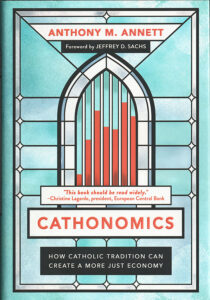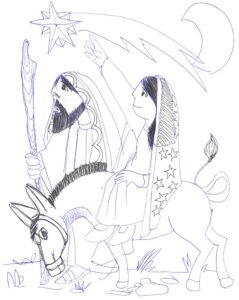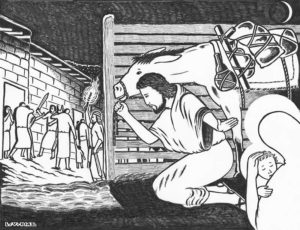“The star came to rest above the place where the child was. At the sight of it the wise men were filled with great joy, and that great joy should fill our hearts as well. It is the same as the joy the shepherds received from the glad tidings brought by the angels. Let us join the wise men in worship and the shepherds in giving glory to God. Let us dance with the angels and sing: To us is born this day a savior who is Christ the Lord. The Lord is God and he has appeared to us…. This feast belongs to the whole universe.”
(From a Homily by St. Basil the Great in Celebrating Sundays: Reflections from the Early Church on the Sunday Gospels. Compiled by Stephen Mark Holmes. Norwich: Canterbury Press, 2012).
Some days it seems like the whole universe is coming to Casa Juan Diego in the Lord Incarnate in the poor – not just at Christmas but all during the year. And while we all are frequently tired and sometimes overwhelmed, we are filled with joy to be able to receive the Lord in the poor.
God Walking the Streets
William Droel reminds us of how the Incarnation of Jesus Christ should affect how we see other people and respond to them. He writes of how our Catholic spirituality can make us aware of the Incarnation in our daily lives: “God walking the streets, God going to the carpenters’ hiring hall, God conversing with teachers and lawyers, God falsely accused, God suffering abuse, God in his death and in resurrection … God embracing the material world. It contrasts with today’s preference for virtual reality over matter and flesh.” (William L. Droel, Monday Eucharist: Connecting Sunday Liturgy and Daily Work and Relationships. Chicago: Acta Publications, 2015.
Receiving the Lord in Disguise at Casa Juan Diego
When families arrive at Casa Juan Diego seeking shelter after a long journey, we are reminded of the journey of Mary and Joseph who sought a place to stay where their child, the long-awaited Messiah, could be born.
In the last few months, not yet Christmas, many families have been asking for a place in the inn of Casa Juan Diego after their long journey. One family included a woman, her husband, and several children, the woman about to give birth, the father sick with cancer. There really was no room in the inn of Casa Juan Diego, but we found a place for them. After a difficult journey, people come who are ill, like the little girl who was just hospitalized having trouble breathing – her asthma aggravated by the journey from Venezuela. Or the baby with various symptoms apparently related to having to change to different types of baby formula so often on the trip to the United States (lucky to have food at all). Desperate people taking risks because they feel they have no alternative.
It is especially at this time of year when we reflect on the Incarnation—the eternal Word born of a woman—that we realize profoundly that the person at our door is not just “Jose Martinez” or “Miranda Garcia,” but the Lord himself in the disguise of the poor, no matter from where they have come. At this moment there are so many at our doors that we are having to develop new ways to assist so that there will not be large numbers in the streets waiting to be served.
Good Samaritans who find people who have recently arrived in Houston and are living on the streets have been bringing families and individuals to us, seeking a place in the inn of Casa Juan Diego. We do whatever we can, but we need the help of all the community as well to receive the immigrants and refugees who come to Houston each day.
Our houses are overflowing and we cannot always say yes.
These are God’s people. What shall we do? We hope the community will help.
Fr. Cantalamessa, Preacher to the Papal Household, Asks for a New “Crusade”
Raniero Cantalamessa, preacher to the papal household for several popes, reminds us that even though we cannot see Jesus in Galilee as others did during his time on earth, as we look for Jesus today, we can especially find him in the poor:
“Since the ascension, all that was humanly visible in Christ is now seen in the poor and suffering who are his living representatives. In fact, if by the Incarnation, every person—as certain Fathers of the Church loved to say—has been somehow assumed by the Word, it is the poor, the suffering and rejected that have been very particularly taken up by the Word, due to the way in which the incarnation came about. Jesus could actually have been born and lived a rich life, honored and glorious, yet he chose to be born and live poor, suffering and despised. The incarnation attests that the Word became man, but the paschal mystery attests what kind of man the Word had become: a man who was defenseless, condemned, and crucified.”
The Fathers of the Church insisted that we follow Matthew 25 in the Gospel, honoring Christ in the poor by feeding the hungry, clothing the naked, taking in the stranger. Fr. Cantalamessa has added to that, updating for our time this commandment:
“Today, the duty to honor Christ in the poor asserts itself in a different way. It is not a question of giving alms to the first one that asks you … it is not enough. It is, above all, a question of opening our eyes to the scandalous injustice in the world where less than twenty percent of the world’s population (roughly what corresponds to the rich and Christian peoples in the northern countries) consumes more than eighty per cent of the earth’s resources.
“I am of the opinion,” writes Fr. Cantalamessa, “that, just as in medieval times great popes and saints traveled all over the Christian world to organize the crusades, so today we must pray God for something similar to happen, a sort of mass mobilization of all Christianity for a new crusade: a crusade to free the thousands and thousands of Christ’s living temples who are dying of hunger, disease and misery. This could be a ‘crusade’ worthy of the name, worthy, that is, of the crucifix! (75)” (Raniero Cantalamessa, The Eucharist: Our Sanctification. Liturgical Press, 1993, 1995.)
Of course, the gap between rich and poor in the world is currently much larger than what Fr. Cantalamessa described in the 90’s. We have not seen enough people taking up his idea of a crusade to free the poor of the world from their misery.
Economy of Francesco—An Economy of the Gospel
 The three-day meeting with Pope Francis in Assisi of a thousand young economists, entrepreneurs, changemakers, students, and workers from 100 countries this past September 22-24, 2022 on the “Economy of Francesco” might be the real beginning of Fr. Cantalamessa’s idea of a crusade for an economy for freeing the thousands and thousands of Christ’s living temples who are dying of hunger, disease and misery around the world.
The three-day meeting with Pope Francis in Assisi of a thousand young economists, entrepreneurs, changemakers, students, and workers from 100 countries this past September 22-24, 2022 on the “Economy of Francesco” might be the real beginning of Fr. Cantalamessa’s idea of a crusade for an economy for freeing the thousands and thousands of Christ’s living temples who are dying of hunger, disease and misery around the world.
The vision of honoring Christ in the poor as well as building an economy of the Gospel, one which incorporates an ethics of the human person and is open to transcendence, creating wealth for all, caring for creation, and spreading joy instead of only riches was given flesh at the Assisi meeting. This new economy, expressed as an economy of friendship with the earth and an economy of peace is inspired by St. Francis of Assisi. The covenant that the thousands of young people who attended the Assisi meeting signed included commitment to “an economy that leaves no one behind, in order to build a society in which the stones rejected by the dominant mentality become cornerstones.” Finance, in this model, becomes a “friend and ally of the real economy and of labor.”
The Incarnation and God’s Plan
Reading the Bible and reflecting on God’s plan revealed there makes us understand that many things in our world are not going according to His plan. Not when so many are suffering on the peripheries. – the poor, the migrants. Addressing the situation of migrants and refugees today, Pope Francis wrote the following in his “Message for the World Day of Migrants 2022”:
“No one must be excluded. God’s plan is essentially inclusive and gives priority to those living on the existential peripheries. Among them are many migrants and refugees, displaced persons, and victims of trafficking. The Kingdom of God is to be built with them, for without them it would not be the Kingdom that God wants. The inclusion of those most vulnerable is the necessary condition for full citizenship in God’s Kingdom. Indeed, the Lord says, ‘Come, you who are blessed by my Father. Inherit the Kingdom prepared for you from the foundation of the world. For I was hungry and you gave me food, I was thirsty and you gave me a drink, a stranger and you welcomed me, naked and you clothed me, sick and you took care of me, in prison and you visited me’(Mt 25:34-36)… Building the future with migrants and refugees also means recognizing and valuing how much each of them can contribute to the process of construction.”
Inspiration from the Mass
At Casa Juan Diego we are grateful to the priests who come to celebrate Mass with us each week, where we and our many guests sing with the all the angels and saints in the Holy, Holy: “Heaven and earth are full of your glory!” We remember the angels’ song at Christmas and Mark Zwick, CJD volunteers and the migrants and refugees who have come over the past 42 years to Casa Juan Diego and have passed on, singing with us from heaven. The Mass brings hope and encouragement to those who have just arrived and have found a brief oasis of peace before they step out into the larger community to help to build the future.
To Help the Crusade of the Preacher of the Papal Household Get Started (again?)
and Build the Economy of the Gospel
“It is not a question of giving alms to the first one that asks you; it is not enough. It is, above all, a question of opening our eyes to the scandalous injustice in the world where less than twenty percent of the world’s population (roughly what corresponds to the rich and Christian peoples in the northern countries) consumes more than eighty per cent of the earth’s resources.” (Fr. Raniero Cantalamessa)
- Pray that God’s plan for a better world may be implemented.
- Read Anthony Annett’s Cathonomics and start study groups.
- Work for immigration reform with work permits.
- Join with those who work to have the IMF and World Bank forgive debt for poor countries.
- Work against climate change – poor countries suffer terrible effects, contribute little to problem.
- Begin or adapt small businesses which include the voice of the workers.
- Receive migrants and refugees in your parishes.
Houston Catholic Worker, Vol. XLII, No. 4, October-December 2022.



